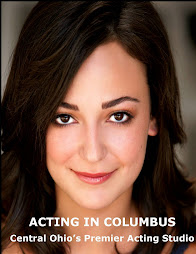
Monologue Nervousness
The prospect of presenting an audition monologue can terrify even the most experienced actor. Very few actors look forward to giving their best shot in front of a bunch of critical strangers sitting behind a table. It is simply not natural human activity. But, as we all know, the ability to present a competitive monologue has a direct relationship to the number of times you get cast, especially in stage plays.
The correction to actor nervousness is to commit fully to playing an action in pursuit of an objective. Commit to the given circumstances of the play from which the monologue is taken. However, that is not as easy as it sounds. It is difficult to focus your mind when you are having a panic attack.
One trick that has served me well over the years is to select a monologue in which I am trying to get somebody to do something. I call this a "you-oriented" piece. An "I-oriented" piece, on the other hand, is maybe a poetic memory thing. Tom's lovely final speech in The Glass Menagerie is like that. My experience is that, when nervous, it is very calming to have a clear, almost tangible acting objective. The more obvious the objective is, the better. A monologue is really a duologue, right? And a duologue is a scene. A monologue, in other words, is a scene in which the other person is pretend. Further, a scene is a negotiation. And in any negotiation, there must be a way you can win and a way you can lose. A "you-oriented" monologue sets up a negotiation quickly and easily.
A nervous actor in an audition situation can have a lot of difficulty committing to the given circumstances of the monologue. Instead, his objective becomes: "I want to get through this audition." To understate the case, that is not a good objective. Standing up there and saying the words in the script becomes the action in pursuit of that objective. And the obstacle is fear. Acting is doing. And if what you are doing is trying to get through an audition, then you will not be doing whatever the character you are playing is supposed to be doing.
It is impossible to relax by telling yourself to relax. As soon as you tell yourself to relax, you are going to get more nervous. In order to think about relaxing, you necessarily must first think about how nervous you are. And when you think about being nervous, your brain tends to develop the actor's equivalent of white noise. Many actors go all the way through their monologue listening to white noise. This is why a "you-oriented" monologue selection might help. We all learn as children what is involved in trying to get our own way. A "you-oriented" selection, regardless of the context, feels as comfortable as a well-worn glove.
Now, I am not suggesting that you never try an "I-oriented" monologue. They can be majestic and poetic if done well. They, too, require a provable objective. It just may be a little more difficult to get in touch with that. If you are the enviable kind of actor that does not get nervous with monologues, then by all means take a look at Mary's morphine-induced Act III reverie in Long Day's Journey Into Night, or Edmund's Act IV memories of his time at sea from the same play. This is world-class material, no question about it, and I applaud you for attempting it. But if you grapple with monologue nerves, keep what I am saying here in mind. Look at Starbuck's Act I attempt in The Rainmaker to hustle a group of skeptical farmers. Or Maggie's Act II monologue from Shadow Box in which she tries to get her cancer-ridden husband to come home with her. Those are both "you-oriented".












